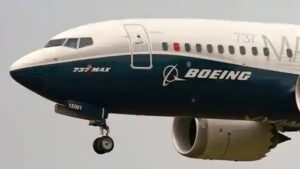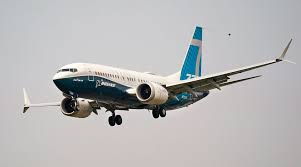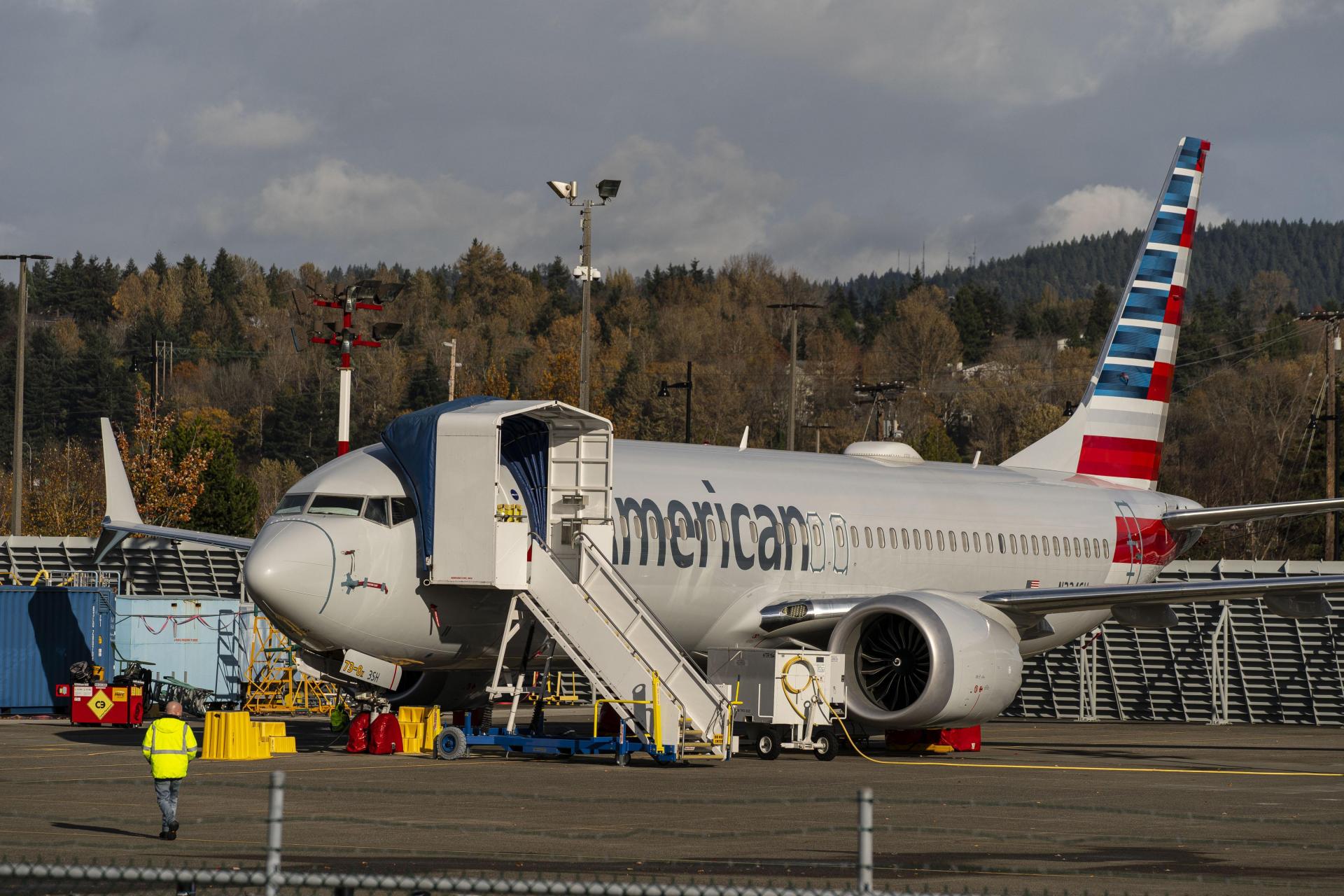US regulators clear Boeing 737 Max to fly again after 20-month grounding
Washington, November 18, 2020: After nearly two years and a pair of deadly crashes, US Federal Aviation Administration is clearing Boeing’s 737 Max for flight.
The nation’s air safety agency announced the move early Wednesday, saying it was done after a comprehensive and methodical 20-month review process.
Regulators around the world grounded the Max in March 2019, after the crash of an Ethiopian Airlines jet. That happened less than five months after another Max flown by Indonesia’s Lion Air plunged into the Java Sea. A total of 346 passengers and crew members on both planes were killed.
The planes won’t return to the skies for a while. The FAA says it must approve pilot training changes for each US airline and airlines must perform required maintenance on the planes.
The Federal Aviation Administration is expected on Wednesday to clear Boeing’s 737 Max to fly again after grounding the jet for nearly two years due to a pair of crashes that killed 346 people.
U.S. Federal Aviation Administration (FAA) chief Steve Dickson is “100% confident” in the safety of the Boeing 737 MAX but says the airplane maker has more to do as it works to improve its safety culture.
Dickson on Wednesday signed an order to allow the best-selling plane to resume flights after it was grounded worldwide in March 2019 following two crashes that killed 346 people and led to Boeing’s biggest crisis in decades.
 The order will end the longest grounding in commercial aviation history and paves the way for Boeing to resume U.S. deliveries and commercial flights by the end of the year.”We’ve done everything humanly possible to make sure” these types of crashes do not happen again,” FAA Administrator Dickson told Reuters in a 30-minute telephone interview, adding the design changes “have eliminated what caused these particular accidents.”
The order will end the longest grounding in commercial aviation history and paves the way for Boeing to resume U.S. deliveries and commercial flights by the end of the year.”We’ve done everything humanly possible to make sure” these types of crashes do not happen again,” FAA Administrator Dickson told Reuters in a 30-minute telephone interview, adding the design changes “have eliminated what caused these particular accidents.”
The FAA is requiring new training to deal with a key safety system called MCAS that is faulted for the two fatal crashes as well as significant new safeguards and other software changes.
“I feel 100% confident,” said Dickson, a former airline and military pilot, who took over as FAA administration in August 2019 and took the controls for a 737 MAX test flight in September.
In a video message released on Wednesday, he said that the 20-month review was “long and grueling, but we said from the start that we would take the time necessary to get this right.”
Dickson said he emphasized to Boeing the importance of safety. “I understand they have a business to run but they don’t have anything if they don’t have a safe product,” Dickson said.
Dickson suggested Boeing has more to do to improve safety.
“They have taken some actions, but it’s going to take more then putting new processes in place and moving boxes around the organization chart. Cultural changes take a long time to take effect and we’ve got to be skeptical,” he said.
Boeing said it is “committed to learning from our mistakes to build a safer future so accidents like this never happen again.”
The move would come after numerous congressional hearings on the crashes that led to criticism of the FAA for lax oversight and Boeing for rushing to implement a new software system that put profits over safety and ultimately led to the firing of its CEO.
Regulators around the world grounded the Max in March 2019, after the crash of an Ethiopian Airlines jet. That happened less than five months after another Max, flown by Indonesia’s Lion Air, plunged into the Java Sea. All passengers and crew members on both planes were killed.
Investigators focused on anti-stall software that Boeing had devised to counter the plane’s tendency to tilt nose-up because of the size and placement of the engines. That software pushed the nose down repeatedly on both planes that crashed, overcoming the pilots’ struggles to regain control. In each case, a single faulty sensor triggered the nose-down pitch.
Boeing’s redemption comes in the middle of a pandemic that has scared away passengers and decimated the aviation industry, limiting the company’s ability to make a comeback. Air travel in the U.S. alone is down about 65% from a year ago.Boeing sales of new planes have plunged because of the Max crisis and the coronavirus pandemic. Orders for more than 1,000 Max jets have been canceled or removed from Boeing’s backlog this year. Each plane carries a sticker price between $99 million and $135 million, although airlines routinely pay far less than list price.
John Hansman, an aeronautics professor at MIT, said that people typically avoid airplanes for a few months after there are problems. But the Max case is unusual, and were it not for the novel coronavirus, Hansman said he would feel safe flying on a Max.
“This whole thing has had more scrutiny than any airplane in the world,” he said. “It’s probably the safest airplane to be on.”
American is the only U.S. airline to put the Max back in its schedule so far, starting with one round trip daily between New York and Miami beginning Dec. 29.
Nearly 400 Max jets were in service worldwide when they were grounded, and Boeing has built and stored about 450 more since then. All have to undergo maintenance and get some modifications before they can fly.
Pilots must also undergo simulator training, which was not required when the aircraft was introduced. Hansman said pilot training for qualified 737 pilots shouldn’t take long because Boeing has fixed problems with the Max’s software. It no longer automatically points the plane’s nose down repeatedly, and doesn’t override commands from the pilot, according to Boeing. The company posted a summary of changes to the plane.
Relatives of people who died in the crashes remain unconvinced of the Max’s safety. They accused Boeing of hiding critical design features from the FAA and say the company tried to fix the tendency for the plane’s nose to tip up with software that was implicated in both crashes.
“The flying public should avoid the Max,” said Michael Stumo, whose 24-year-old daughter died in the second crash. “Change your flight. This is still a more dangerous aircraft than other modern planes.”
Boeing’s reputation has taken a beating since the crashes. Its then-CEO, Dennis Muilenburg, initially suggested that the foreign pilots were to blame. However, congressional investigators discovered an FAA analysis — conducted after the first Max crash — that predicted there would be 15 more crashes during the plane’s life span  if the flight-control software were not fixed.
if the flight-control software were not fixed.
After an 18-month investigation, the House Transportation Committee heaped blame on Boeing, which was under pressure to develop the Max to compete with a plane from European rival Airbus, and the FAA, which certified the Max and was the last agency in the world to ground it after the crashes. The investigators said Boeing suffered from a “culture of concealment,” and pressured engineers in a rush to get the plane on the market.
Boeing was repeatedly wrong about how quickly it could fix the plane. When those predictions continued to be wrong, and Boeing was perceived as putting undue pressure on the FAA, Muilenburg was fired in December 2019.
Dickson — who flew F-15 fighters in the Air Force before serving as a pilot and an executive at Delta Air Lines — foreshadowed the agency’s decision to clear the Max to fly again with comments in September, after he climbed into the cockpit of a Max for a two-hour test flight.
“I liked what I saw on the flight,” Dickson declared that day. Some relatives of passengers who died in the Ethiopian crash dismissed Dickson’s flight as a stunt to benefit Boeing.
In recent weeks, European regulators also signaled their likely approval of Boeing’s work. Regulators in Canada and China are still conducting their own reviews. Relatives say it’s too soon, and they and their lawyers say Boeing and the FAA are withholding documents.
Naoise Ryan, an Irish citizen whose husband died in the Ethiopian crash, said the Max is “the same airplane that crashed not once but twice because safety was not a priority for this company.”
Anton Sahadi, who lives in Jakarta, Indonesia, and lost two brothers in the Lion Air crash, said he feels it is too early for the Max to fly again.
“I, personally, feel so regretful for the decision to unground the Boeing’s 737 Max,” he said. “The cases from the incidents are not 100% finished yet. There are many of them still in process. I think all the victims’ family in Indonesia and Ethiopia will feel the same, so regretful, why it can fly again because we are still in the recovery process for our problems because of the incidents.”







